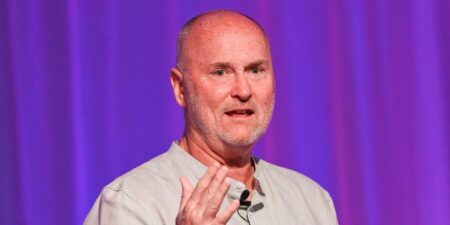All eyes were on Warren Buffett’s Berkshire Hathaway and its second-quarter earnings on Saturday, with investors searching for clues about how tariffs — and the prospect of more to come — are affecting corporate America.
The investor’s company, which owns scores of businesses across many sectors and is viewed by Wall Street as a microcosm of the US economy, spelled out where it was taking a hit.
Berkshire said trade ‘uncertainties’ were hitting some of its biggest consumer brands
First-half revenues fell about 12% at apparel retailer Fruit of the Loom, 10% at children’s clothing brand Garan, which owns Garanimals, and 39% at Jazwares, the maker of Squishmallows.
Berkshire doesn’t disclose revenue or profit figures for individual businesses within a division, but it does call out significant changes in performance.
Buffett and his team said those drops primarily reflected lower sales volumes, which they blamed on “uncertainties” stemming from trade policies and tariffs that delayed orders and shipments, as well as restructuring.
The conglomerate saw second-quarter revenues fall 5% to around $3.5 billion within the consumer-products segment of its manufacturing division, which houses those three companies. First-half revenues declined for most of the businesses in that segment, Berkshire said.
Buffett’s company said the “pace of changes” in macroeconomic events, geopolitical conflicts, and trade policies such as tariffs “accelerated” in the first half.
There’s “considerable uncertainty” about how those forces will play out and affect product availability, the cost and efficiency of its supply chains, and customer demand for its products and services, Berkshire added.
The company, which has a $1 trillion market value, added that this could harm “most, if not all, of our operating businesses” as well as its public-market bets, which could “significantly affect our future results.”
Forest River, which makes RVs and pontoon boats, also saw second-quarter revenue drop around 5%, in part because of lower sales volumes. Brooks Sports grew second-quarter revenues by 18%, partly by selling more units.
Please help BI improve our Business, Tech, and Innovation coverage by sharing a bit about your role — it will help us tailor content that matters most to people like you.
What is your job title?
(1 of 2)
What products or services can you approve for purchase in your role?
(2 of 2)
this data to improve your site experience and for targeted advertising.
By continuing you agree that you accept the
Terms of Service
and
Privacy Policy
.
Thanks for sharing insights about your role.
Slimmer first-half profits from Jazwares, Garan, Forest River, and Duracell fueled a 15% drop in pre-tax earnings in the consumer-goods manufacturing segment. Berkshire attributed that slump to “generally lower sales volumes” and stubborn overheads.
Berkshire’s energy and railway divisions had higher earnings
Other divisions performed better, with higher net earnings from BNSF Railway, Berkshire Hathaway Energy, and the insurance group’s investing activities last quarter.
But earnings nearly halved from insurance underwriting and ticked lower for the wider manufacturing, service, and retail division, contributing to a 4% drop in Berkshire’s operating profits to $11.2 billion.
Berkshire didn’t immediately respond to a request for comment from Business Insider.
Buffett is no fan of tariffs
While Buffett rarely makes public statements about politics, he has made it clear that he’s skeptical of tariffs.
He told Berkshire’s annual meeting in May that they shouldn’t be a “weapon” and “balanced trade is good for the world.”
The billionaire, who turns 95 this month and plans to step down as CEO at the end of this year, said during a CBS documentary released in March that tariffs are “an act of war, to some degree” and “the tooth fairy doesn’t pay’ em!”
President Donald Trump has touted tariffs as a way to equalize trading relationships between the US and its partners, but many economists have warned they may accelerate inflation, slow growth, and disrupt global commerce.
Read the full article here
















